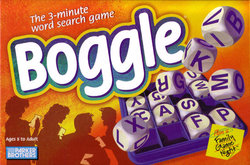Boggle
|
|
Boggle is a word game designed by Allan Turoff and trademarked by Parker Brothers / Hasbro, Inc.
| Contents |
Rules
Play begins by randomizing a 4×4 tray of dice-like "letter cubes", normally by shaking. Each of the 16 cubes has a different letter printed on each of its sides. The cubes settle into a 4×4 tray such that only the top letter of each cube is visible. After the cubes have settled into the grid, a 3-minute timer is started and all players simultaneously begin the main phase of play.
Each player searches for words that can be constructed from the letters of sequentially adjacent cubes. Adjacent includes the horizontally, vertically, and diagonally neighboring cubes. Words must be at least 3 letters long, may include singular and plural separately, but may not utilize the same letter cube more than once per word. The players record all words found by writing on their private sheet of paper. After 3 minutes have elapsed, all players must stop writing and the game enters the scoring phase.
Boggle_board_and_scoring.jpg
Each player goes through his or her list of discovered words. If two or more players wrote the same word, it is discarded from all players' lists. Any player may challenge the validity of a word, in which case a previously nominated dictionary is used to verify or refute the word. For all words remaining after duplicates have been eliminated, points are awarded based on the length of the word. The winner is the player whose point total is highest. Any ties are typically broken by count of long words.
| Word Length | Points |
|---|---|
| 3 | 1 |
| 4 | 1 |
| 5 | 2 |
| 6 | 3 |
| 7 | 5 |
| 8+ | 11 |
Strategy
- Given the limited time, it is useful, particularly in the 4×4 game, to memorize common sets of anagrams. For example, when one spots the word tea, one instantly checks for the presence of eat, ate, and eta, rather than waiting to stumble across them later.
- Before writing any words, one should scan the tray for the letter s and the combinations ed and er. Being aware of the possibilities often allows one to find words in groups, such as rove leading to roves, roved, rover, and rovers.
- In a game of many players, it is relatively less beneficial to hunt for common words, because only unique words count. At times two players with long lists of common words will wipe each other out, handing the victory to a third player with a short list of unusual words.
- In the 5×5 game, it is relatively less beneficial to hunt for small words, because large words score so heavily. In contrast to the smaller tray, in which there often isn't any word longer than 6 letters, the larger game often has a handful of words of 8 letters or longer.
Boggle Game Variants
The game was taken to a new level with the introduction of "Big Boggle," later marketed as "Boggle Master," which features a 5×5 tray, and disallows 3-letter words. The Boggle Master set has an adapter that can convert the larger grid into a regular Boggle grid.
External links
- Algorithms and programs for "solving" Boggle (http://www.gtoal.com/wordgames/boggle.html)
- Web-based Boggle (http://weboggle.shackworks.com)
- Web-based Boggle Java Applet (http://bogglet.ubkl.net/)fr:Boggle

